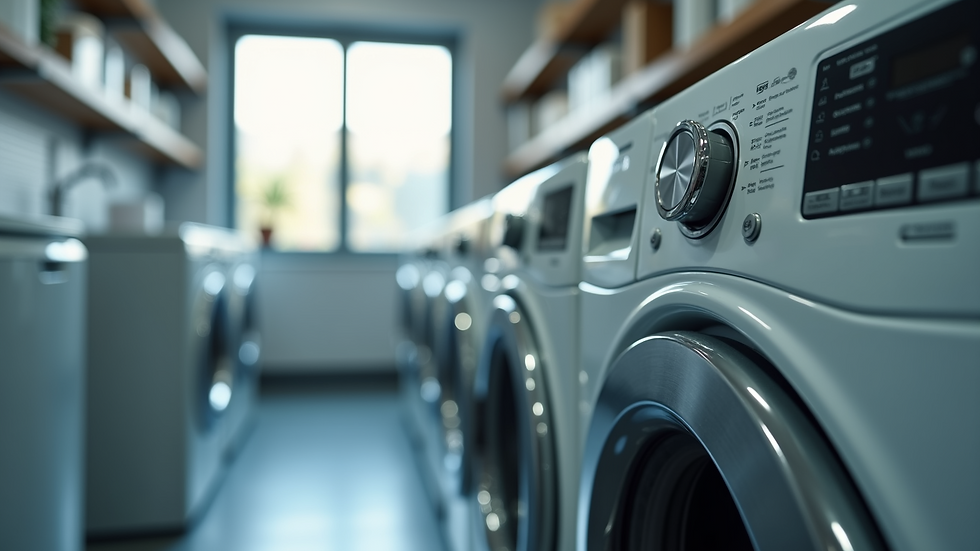How to Extend the Lifespan of Your Home Appliances
- henrichsenterprise
- Jul 22, 2025
- 3 min read
Home appliances are an essential part of our daily lives. From refrigerators to ovens and washing machines, they make our tasks easier and more efficient. However, like any machinery, these appliances can wear out over time. Knowing how to properly maintain and care for them can extend their lifespan significantly. In this blog post, we will explore practical tips and strategies to maximize the life of your home appliances.
Understanding Appliance Lifespan
Before we dive into maintenance tips, it's essential to understand the typical lifespan of common home appliances. This knowledge will help you gauge when to perform upkeep activities or consider replacements.
Refrigerators: 10-15 years
Washing Machines: 10-15 years
Dishwashers: 9-10 years
Ovens/Stoves: 10-15 years
Microwaves: 9-10 years
These numbers can vary based on the brand, model, and usage. Understanding these time frames will help you plan your maintenance activities effectively.

Simple Regular Maintenance Tips
Regular maintenance is key to prolonging your appliances' lifespan. Here are some straightforward actions you can take:
Clean Regularly: Dust and grime can hinder the efficiency of your appliances. For example, a dirty refrigerator can lead to overheating, affecting its efficiency. Wipe down surfaces and clean filters frequently. For refrigerator coils, aim for every 6 months.
Check Seals and Gaskets: Ensure your refrigerator and oven door seals are intact. A broken seal can lead to temperature fluctuations, forcing your appliance to work harder and reducing its lifespan.
Avoid Overloading: Many appliances work best when you follow the manufacturer's guidelines. Overloading washing machines or dishwashers can lead to mechanical failure. For instance, wash only a recommended load to avoid wear and tear.

Are Appliances Worth Repairing?
It's crucial to weigh the benefits of repairing versus replacing an appliance. Often, the cost of repair can be significant, leading homeowners to contemplate purchasing a new unit. A guideline for deciding on repairs is: if the repair cost is more than 50% of the appliance's value, it may be time to invest in a new one.
For example, if your refrigerator needs a compressor replacement costing $700 and the estimated value of the fridge is $1000, you might consider replacing it instead. On the other hand, if a simple part malfunction could be repaired for $150, it makes more sense to keep the appliance.
However, if your appliance is less than 50% through its expected life cycle, repairing can be a good investment. Additionally, hiring professional appliance repair services can ensure that your appliance is repaired correctly to prevent future issues.
Smart Usage Practices
Using your appliances wisely can significantly contribute to their longevity. Here are some smart usage practices:
Temperature Settings: Adjust your fridge and freezer to the recommended settings. Keeping your fridge around 37°F and your freezer at 0°F is optimal. This will help prevent excessive workload and extend equipment lifespan.
Minimize Frequent Opening: For refrigerators and ovens, frequent door openings can change temperature quickly and put extra strain on the appliance. Try to minimize how often you open the door, especially during cooking.
Regular Usage: For appliances like dishwashers and washing machines, consistent use helps maintain seals and gaskets. If left unused for long periods, you may experience dried-out seals that can lead to leaks.

Seasonal Checks and Professional Maintenance
It's a good practice to perform seasonal checks for your appliances. These checks can catch potential issues before they turn into significant problems:
Inspect Ventilation: Ensure that your refrigerator and dryer have adequate ventilation. Blocked vents can lead to overheating and reduced efficiency.
Get Professional Service: Schedule regular maintenance checks with professionals. An expert can identify problems that you might miss and service your appliances correctly. Regular service can help keep warranties valid too.
Make Use of Appliance Timing: Use heavy appliances during non-peak hours to avoid undue strain from high usage times. This gives your appliances a longer break and reduces energy consumption.
When Is It Time to Replace an Appliance?
While maintenance can extend the lifespan of an appliance, there are signs indicating it may be time to replace it:
Age: If your appliance is nearing or has surpassed its expected lifespan, it might be more cost-efficient to replace it than to repair recurring problems.
Frequent Breakdowns: If an appliance constantly requires repairs, it may be time for a replacement.
Inefficiency: Older appliances can be less energy-efficient. You may notice higher utility bills, indicating it's time to upgrade to a more efficient model.
Final Thoughts on Appliance Care
Taking care of your home appliances not only saves you money but also enhances the quality of your daily life. Regular maintenance, smart usage, and timely repairs can add years to their lifespan. Remember to plan for seasonal checks, consult professionals when needed, and be mindful of an appliance's lifespan and performance. By following these tips, you can ensure your appliances serve you well for many years to come.



Comments